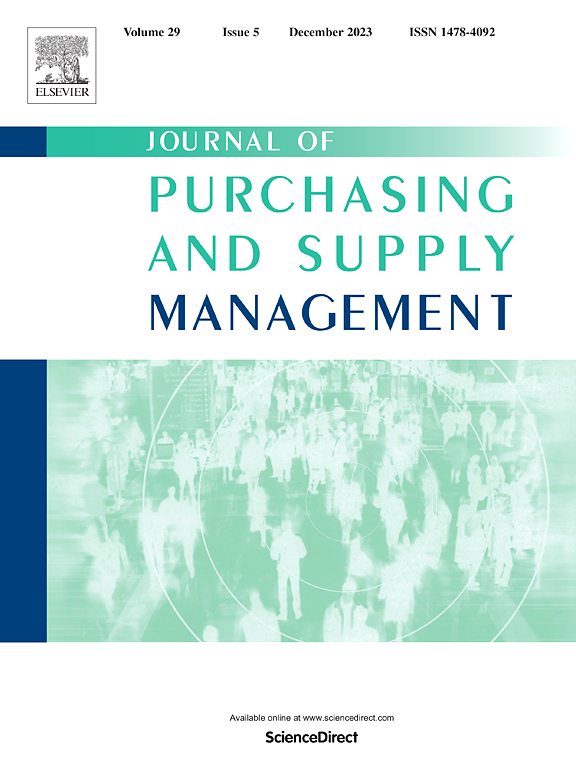第三方环路运营商的循环商业模式:基于活动的内部或外部活动视角
IF 8.7
2区 管理学
Q1 MANAGEMENT
引用次数: 0
摘要
第三方环路运营商在循环经济(CE)中发挥着重要作用,为其他企业关闭资源环路。这些第三方循环运营商面临着一个关键的商业模式决策:是在内部还是从外部开展循环经济活动。我们采用基于活动的观点(ABV)作为理论视角,将循环经济分为五项活动:收集、分类、预处理、转化和整合。通过使用定性比较分析法(QCA)对 79 个第三方循环运营商进行分析,我们发现这些活动是以两种捆绑方式进行的。当第三方循环运营商在内部进行收集活动时,他们很可能也在内部进行分类活动。其余的活动(预处理、转换和整合)也是一起进行的,可以是内部的,也可以是外部的。此外,我们还发现了一些边界条件,这些边界条件会影响这些活动捆绑在内部或外部进行的原因。当供应高度集中时,第三方环路运营商倾向于在内部进行收集和分拣,因为获得高度集中的来源会带来竞争优势。当废物状况的不确定性较低时,第三方循环运营商可以在内部开展高效的预处理、转化和整合活动。当市场上没有任何行为者能够开展相关活动时,就会出现活动缺口。在这种情况下,第三方循环运营商通过在内部开展活动来填补空白。本文章由计算机程序翻译,如有差异,请以英文原文为准。
The circular business models of third-party loop operators: An activity-based view on performing activities internally or externally
Third-party loop operators play an important role in the circular economy (CE) by closing the resource loops for other firms. These third-party loop operators face a key business model decision: whether to perform CE activities in-house or externally. We adopt the activity-based view (ABV) as a theoretical lens to divide the CE into five activities: collection, sorting, pre-processing, transformation, and integration. By analysing 79 third-party loop operators using Qualitative Comparative Analysis (QCA), we found that these activities are performed in two bundles. When third-party loop operators perform the collection activity in-house, they are likely to perform the sorting activity in-house as well. The remaining activities (pre-processing, transformation, and integration) are also performed together, either in-house or externally. Furthermore, we identify some boundary conditions that affect why these activity bundles are performed in-house or externally. When supply concentration is high, third-party loop operators tend to perform collection and sorting in-house because access to highly concentrated sources can result in a competitive advantage. When the uncertainty about waste condition is low, third-party loop operators can develop efficient pre-processing, transformation, and integration activities in-house. Activity gaps emerge when no actor in the market can carry out the activity. In this case, third-party loop operators fill the gap by carrying out the activity internally.
求助全文
通过发布文献求助,成功后即可免费获取论文全文。
去求助
来源期刊

Journal of Purchasing and Supply Management
MANAGEMENT-
CiteScore
10.30
自引率
18.00%
发文量
31
审稿时长
70 days
期刊介绍:
The mission of the Journal of Purchasing & Supply Management is to publish original, high-quality research within the field of purchasing and supply management (PSM). Articles should have a significant impact on PSM theory and practice. The Journal ensures that high quality research is collected and disseminated widely to both academics and practitioners, and provides a forum for debate. It covers all subjects relating to the purchase and supply of goods and services in industry, commerce, local, national, and regional government, health and transportation.
 求助内容:
求助内容: 应助结果提醒方式:
应助结果提醒方式:


